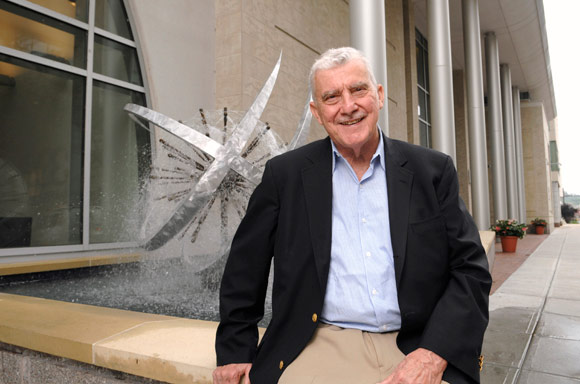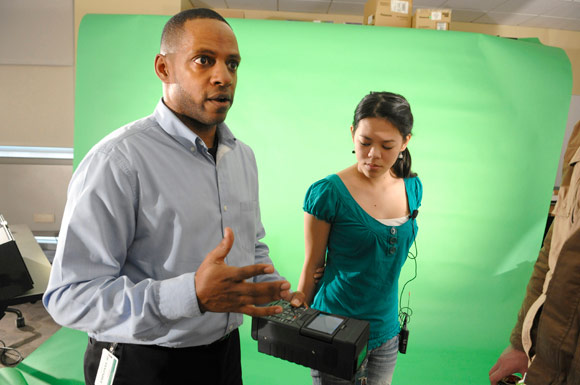When you think about video games, it’s not often you think about where they came from, who created them – or even where they were created. But at the same time, the idea of an east coast video game development company seems odd — isn’t Silicon Valley, California, the birthplace of all things virtual?
That is not the case. In fact, Pennsylvania – more specifically its capital city, Harrisburg – is laying down tracks to become a video game hub.
The noise is coming from a few core folks at Harrisburg University along with Paul Benninghove, owner of a local web design company. They are looking to mimic the successes seen at other east coast towns, like Raleigh, N.C., Pittsburgh, and the Baltimore and Hunt Valley areas of Maryland, which are already drawing talented designers and programmers from the Harrisburg region.
Benninghove, who runs the local web design firm, Mudbrick Creative, is working with Charles Palmer, Executive Director of Center for Advanced Entertainment and Learning Technologies at Harrisburg University, and Dr. Ed Harrell, Entrepreneur in Residence at Harrisburg University, to foster the beginnings of a video game development community.
“Currently no local programs support this – no one is doing it yet,” Benninghove said. “It needs university support to grow.”
Around the state, there is already growth. In Pittsburgh, Schell Games and Etcetera Entertainment both have ties to the entertainment tech hub at Carnegie Mellon University. Cipher Prime is a young interactive company in Philadelphia but already highly decorated. In Langhorne, there's Entertainment Games, a social games maker for sites like Facebook, that just hired three developers last month.
The goal, however, is to do more than just foster one video game company. Benninghove said he’s seen tech companies get just one good project and head elsewhere, often to California.
“I want to plant it here and keep it here,” Benninghove said.
Palmer said Harrisburg is the perfect base to build a community that could really thrive.
“Businesses are always looking for places to build or move companies that are cost-effective and have a built-in talent pool,” Palmer said. “Harrisburg is prime for this because we have a lot of smart people who are looking for that tech-slash-creative outlet. The more opportunities we can provide, the better.
“Video game development incorporates so many disciplines – legal, programming, technical, writers, storytellers – to come together to start the company. And we have all that right here,” Palmer said.
Further, a community lays roots and sparks the businesses and resources around it. And Harrisburg University is ready to help make it happen. Next month, the school will host a “pitch bootcamp” for gaming and tech entrepreneurs. The event does not set up entrepreneurs with investors but with mentors and other interested parties to gauge interest in the Harrisburg market.
Experts from the Founder Institute will play a role and serve as mentors for the entrepreneurs. The event will help shape a curriculum for Harrisburg University, in addition to their undergrad program in game design and development.
“We hope to see a lot interest and build buzz for [the video game industry]. We feel we have the infrastructure to be helpful to them,” Harrell said. “We’re innovative and have the faculty, students and space to do this.”
Harrell said in other cities who have done this successfully, the universities have taken a proactive approach, something he aims to imitate.
Statewide, it has the potential to take hints from California’s other well-known commodity: the movie industry.
This summer, state Senator Daylin Leach, D-Delaware, Montgomery, introduced a bill similar to the successful Film Tax Credit, which offers incentives to production companies and encourages them to film in Pennsylvania. His legislation, the Video Game Production Tax Credit bill (S.B. 700), would offer a tax break to gaming companies that relocate to Pennsylvania. The credits would be given per employee hired, for relocation expenses, for capital expenditures and infrastructure expenses, for real estate costs, and for in-state company expenditures.
“The video game industry is an untapped market in Pennsylvania,” Leach said. “The makeup of the industry means that growth will be more stable and anchored to the community than the fleeting boom of a movie set or an album recording. I believe that bringing these jobs and companies to our state can boost economic growth and fuel huge returns on investment in the form of tax receipts and sustained re-investment.”
Palmer said that in places like Montreal and Raleigh, N.C., a small tax incentive proved very successful in helping those areas become a true “hub” for video game development, competing with the west coast in video game numbers.
On top of that, keeping the area’s talent in a nearby community boosts “brain gain,” Benninghove said.
“There is a lot of money in gaming,” Benninghove said. “Our economy could use a shot of adrenaline.”
From the professor’s perspective, Harrell sees this as another educational opportunity, whether the games created are serious, strategic, educational, or purely for fun.
“Gaming is so exciting because it’s kids interacting with each other, and they learn more by playing. With the internet, you can do games anywhere – locally and globally,” Harrell said.
SARA BOZICH has been writing about the greater Harrisburg area for nearly a decade via her nightlife column and blog, SaraBozich.com. You also can follow her on Twitter, @sarabozich. Send feedback here.
PHOTOS:
Ed Harrell of Harrisburg University
Charles Palmer works with students at Harrisburg University
Palmer works with students at editing center
Palmer works with students on the green screen
All photographs by Jason Minick – provided by Harrisburg University




